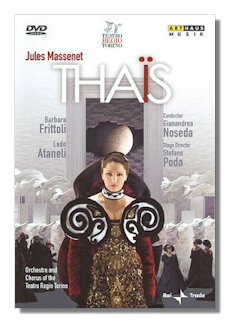
The Internet's Premier Classical Music Source
Related Links
- Massenet Reviews
- Latest Reviews
- More Reviews
-
By Composer
-
Collections
DVD & Blu-ray
Books
Concert Reviews
Articles/Interviews
Software
Audio
Search Amazon
Recommended Links
Site News
 DVD Review
DVD Review
Jules Massenet

Thaïs
- Barbara Frittoli - Thaïs
- Lado Ataneli - Athanaël
- Alessandro Liberatore - Nicias
- Maurizio Lo Piccolo - Palémon
- Nadežda Serdyuk - Albine
- Eleonora Buratto - Crobyle
- Kete van Kemoklidze - Myrtale
- Daniela Schillaci - La Charmeuse
- Diego Matamoros - Un serviteur
Torino Teatro Regio Chorus
Torino Teatro Regio Orchestra/Gianandrea Noseda
Stefano Poda, stage director/choreographer/costume designer
Recorded live from the Teatro Regio Torino, 2008
Arthaus Musik 101385 LPCM Stereo Dolby Digital DTS Widescreen Anamorphic
Also available on Blu-ray Arthaus Musik 101386:
Amazon
- UK
- Germany
- Canada
- France
- Japan
- ArkivMusic
- CD Universe
Some will observe that this Thaïs focuses less on the "flesh" and more on the "spiritual". Stefano Poda's production certainly seems to seek out the philosophical side of Massenet's story about the conversion of the courtesan Thaïs to Christianity. Indeed, his is the kind of approach that eschews the sensational and scandalous in favor of the spiritual and idealistic.
…Until, of course, you see the ballet numbers. Take the Divertissements in the second scene of the Second Act. Here you have consecutive numbers with topless dancers on stage for lengthy periods. Las Vegas makes its way to Torino! I suppose this "costuming" decision was made with some attempt to inject the fleshly side of things as a contrast to the dominating spiritual side. Well, it doesn't work particularly well: for one thing the choreography isn't so good, and the dancers and their movements simply seem out of place in this production, a production in which Thaïs and the other prostitutes wear lengthy, opulent gowns and the imaginative sets, that include a huge wall of plaster casts of ears, eyes and breasts, come across as decidedly austere.
The singing? Frittoli, though she has a bit of wobble here and there, is quite excellent, and dramatically she plays the role of Thaïs quite convincingly. Lado Ataneli fits the general austerity of the production in his acting as the monk Athanaël, and vocally he's quite good. The rest of the cast is fine, as well, and Gianandrea Noseda leads the orchestra and chorus with well judged tempos, and with a sense for nuance and detail. The musical side then is fine.
The camera work and sound reproduction are both excellent, too. I'm not familiar with the Eva Mei recording on Dynamic, but I understand it has its strengths and flaws too. Of course, the Decca, with Rene Fleming, is splendid, but alas is available on CD only.
So, this Arthaus DVD can be recommended heartily, both for its musical strengths and for its interesting though flawed production.
Copyright © 2009, Robert Cummings




















